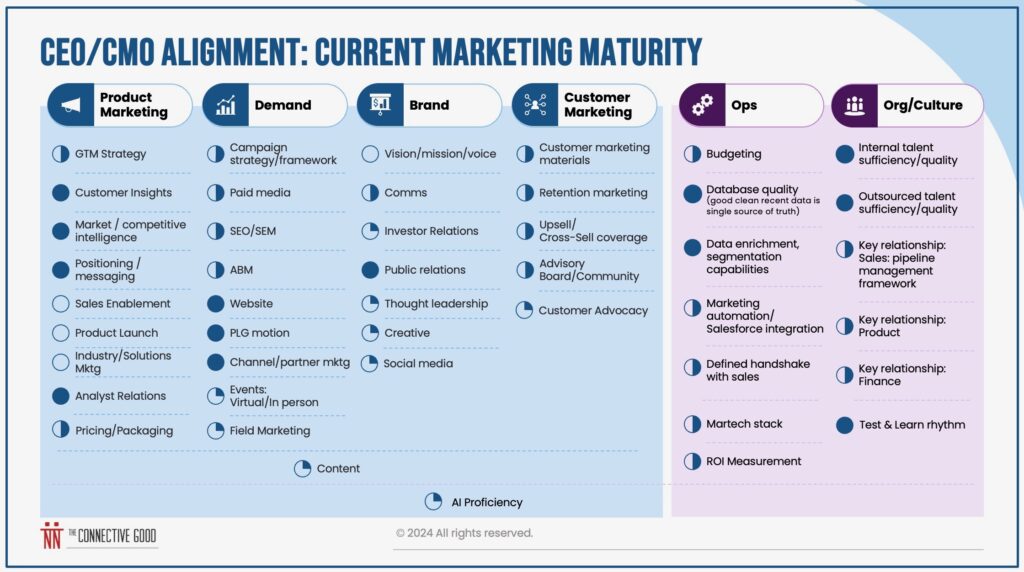One thing I’ve been thinking about a lot lately:
How can CEOs and their CMO candidates do better ‘shared due diligence’ before committing to a CMO job offer?
In my executive searches, I’ve observed that CEOs and investors often are gun-shy about CMO candidates with multiple short tenures, typically those less than ~18-24 months. They worry: “How much impact could this person have had?” And: “Why didn’t they stay if they were crushing it?”
Short CMO tenures can negatively impact not just individual careers, but also the CEO’s hiring confidence, business continuity, and the overall reputation of the marketing function.
Of course, often there are reasonable explanations (companies getting acquired ahead of schedule, for instance) (Here’s a piece I wrote on Why CMOs of Growth-Stage Companies Can Have Short Tenures).
From Defensiveness to Regret
I’ve noticed something new in conversations with hundreds of CMOs recently: a shift away from a defensive stance on short tenures to openly expressing regrets about joining companies without full visibility into factors like a short runway, profitability struggles, or product immaturity.
I just examined the CMO searches I’ve done in the past few years and was pleased to see that the people I have placed have lasted on average well beyond the 18-month mark. Scanning the list, I see 3 years, 5 years, 7 years in one case. Yay. So, intentional recruiting processes may help to make better matches.
A CEO/CMO Alignment Framework
Here’s something else that could help…
It’s a tool I’ve been working on, with the help of some of my recent CMO candidates.

There are several use cases for this framework, both within and beyond hiring:
- The “Rome wasn’t built in a day” use case: Aligning CEOs and CMO candidates on the current maturity of marketing, and setting realistic expectations for the time and resources needed to advance marketing’s impact.
- The “Investor who’s not a marketing expert” use case: Providing investors and board members a quick overview of modern B2B marketing, helping them grasp essential elements and necessary improvements.
- The “Strategy is what you decide not to do” use case: CMOs in the seat can use this framework to demonstrate their priorities – and the necessary tradeoffs—to peers and the Board.
- The “Is this really what I want and can I be successful as a CMO?” use case: Clarifying for CMOs what they are opting into. Many CEOs want their new CMO to be “a builder” — but sometimes what that means is not explicitly defined. This framework could help foster transparent conversations about the starting state and the success criteria. That way, CMO’s won’t be surprised about the level of ‘muck’ they find once they join.
Notes and Caveats
- Naturally, this framework needs an accompanying description of what maturity looks like for each area, most likely customized to the company.
- Not every company needs peak maturity in every area. A good CEO/CMO conversation would center around which elements can be strategically under-invested in.
- This framework may be even more appropriate for a VP of Marketing than a CMO. That’s because the CMO’s impact is felt cross-functionally, in other areas beyond marketing, such as company culture, M&A decisions, etc.
- Finding a match is a two-way street. Many CMO candidates bring their own framework for evaluating a company – not just its marketing maturity, but its products, customers, markets, culture, and financials.
Feedback and Refinement
I shared a previous version of this around on LinkedIn, then refined it based on the feedback. Here are some of the comments. There are some good considerations and ideas here that you could put into action:
- “If I were a candidate- or the CEO – I want this filled out for other functions: Finance, Product, People, etc. Marketing both exists within the larger context of the organization and influences (ideally) that larger context.”
- “An interesting experiment would be to ask the CEO how many hires they think is needed to achieve what is on their worksheet… many of the areas are specializations and they shouldn’t ask/expect a few generalists to do it all (and well).”
- “As a candidate, I’d like to discuss the inter-relationships of the variables as the CEO understands them (as well as get the perspectives of the CFO and CRO on this view) and have a candid conversation about prioritization and investment levels that they’ve been thinking about so far.”
- “Have the CEO fill it out. Have someone in marketing fill it out. Have the candidate fill it out once they have gone through a few interviews. And compare and contrast.“
- “AI proficiency should be somewhere, or in each category.” (Note: I deliberated on how to incorporate this AI proficiency. I landed on spanning it across the whole shebang, because of the huge impact AI is having and is slated to have across all areas of marketing and in how people work, not just within the ops/tech arena.)
Feel free to use this framework for improving your own hiring, setting marketing priorities, budgeting, and aligning workstreams and incentives.
Thanks to all who shared their input!